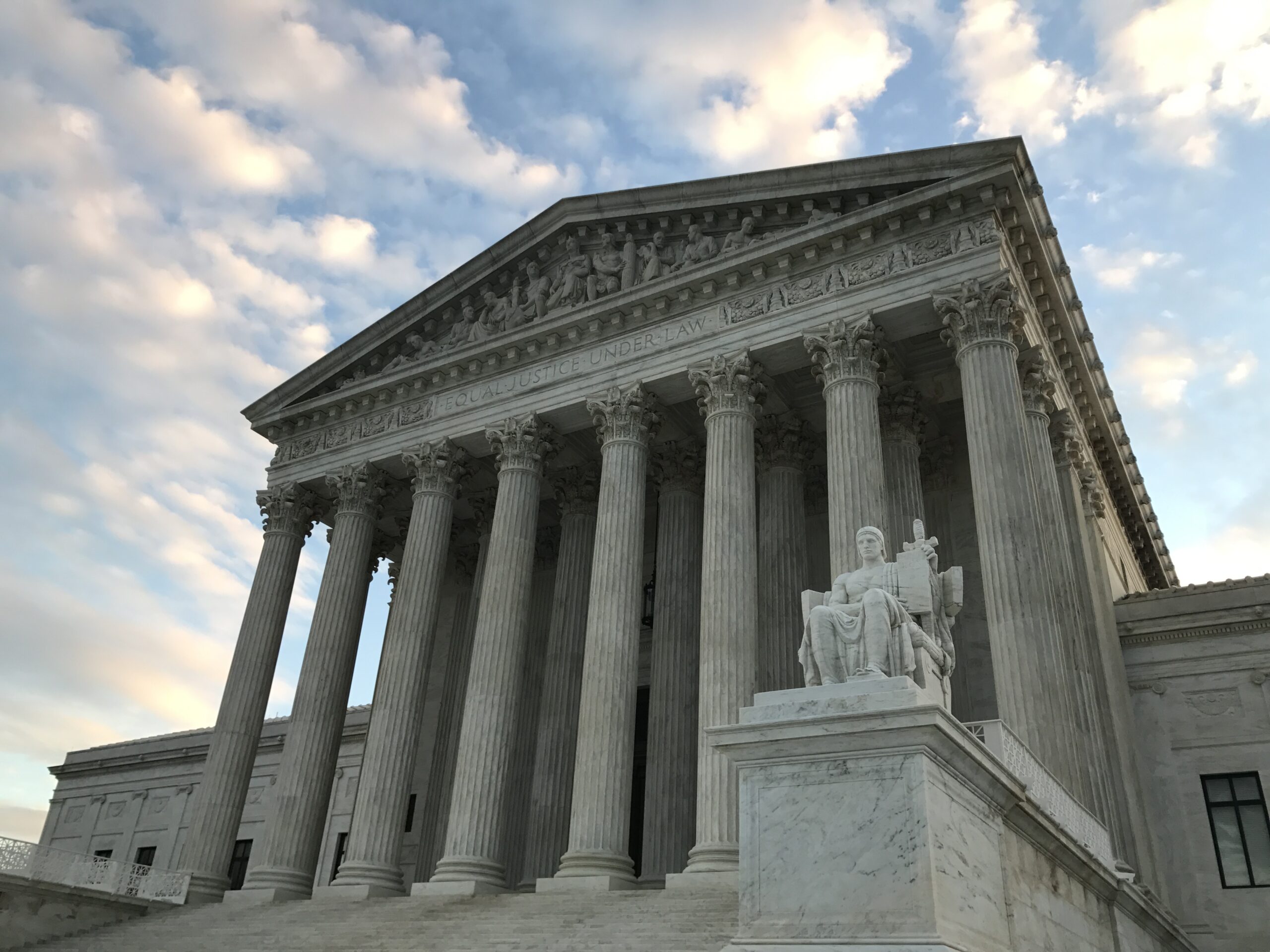Reporters Committee Q&A highlights important First Amendment case before US Supreme Court

Update: On June 8, 2022, the U.S. Supreme Court issued a decision concluding that “there is no Bivens action for First Amendment retaliation.”
On March 2, the U.S. Supreme Court heard oral arguments in a case that asks it to weigh in on a question that could have serious implications for journalists: whether federal officials can be held personally liable for money damages when they retaliate against individuals for exercising First Amendment rights.
The case, Egbert v. Boule, specifically concerns a dispute between the owner of an inn near the U.S.-Canada border and a U.S. Customs and Border Protection agent. In 2017, the inn owner, Robert Boule, accused the agent, Erik Egbert, of trespassing on his private property and retaliating against him for making a complaint to Egbert’s supervisors, an alleged violation of his First and Fourth Amendment rights.
Boule brought his claims under Bivens v. Six Unknown Named Agents of Federal Bureau of Narcotics, a 1971 U.S. Supreme Court ruling in which the Court recognized a right to sue federal officials for damages arising from a violation of certain constitutional rights. The Supreme Court has since recognized so-called “Bivens remedies” in the Fourth, Fifth and Eighth Amendment context, but it has never said such remedies apply to First Amendment violations.
Egbert argues that damages should be unavailable when federal officials violate First Amendment rights. The Reporters Committee, however, says the Supreme Court should reject the border agent’s arguments.

In a friend-of-the-court brief filed with the Supreme Court in January, RCFP and 34 media organizations argued that recognizing a damages remedy is “indispensable to the enforcement of First Amendment rights” and that stripping journalists of the ability to sue federal officers for damages “would invite officials to punish the press for performing its constitutional function.”
It’s unclear how the justices will rule — as our attorneys noted on Twitter, they didn’t spend much time on the First Amendment issue during oral arguments — but as we await their decision, we recently spoke with Grayson Clary, RCFP’s National Security/Free Press Legal Fellow, to learn more about why Bivens remedies are important for journalists, how the Supreme Court has decided previous cases on the issue and what consequences could result from a ruling that sides with the border agent’s arguments.
What is a Bivens remedy?
There’s something of an oddity in our system, which is that while there’s a federal statute that says expressly that you can sue a state or a local official who violates your constitutional rights for damages, there is no equivalent that says the same of federal officials.
In a case called Bivens v. Six Unknown Named Agents of the Federal Bureau of Narcotics, the Supreme Court recognized that this discrepancy meant there would be some scenarios where somebody’s rights have clearly been violated by the federal government, but they risk being left with no remedy if they aren’t entitled to damages. An easy example is someone who’s illegally searched by the FBI but never prosecuted. Ordering the government not to do it again won’t fix the harm that was already caused, and you can’t make it right by throwing out the evidence they found if the government never found anything in the first place. For that person, as Justice John Harlan put it in his concurring opinion, “it’s damages or nothing.”
In the Bivens case, the Supreme Court opted to allow the plaintiff to sue the officers responsible for damages rather than leave him with nothing for the violation of his rights. The Supreme Court has recognized similar so-called Bivens remedies — the right to sue the individual officer for damages — in a couple of contexts since Bivens; the lower courts have recognized Bivens remedies in even more contexts.
What is RCFP’s interest in advocating for Bivens remedies?
We want damages to be available when federal officers violate journalists’ rights and no other remedy can safeguard them. Our concern starts with the proposition that First Amendment rights are very fragile. Often, when you’re denied the opportunity to speak, the right to publish, or the right to gather the news, there are precious things lost before that wrong can be made right. Maybe you don’t get to publish your story at the time the audience would be most receptive to it, maybe you don’t get to hold your demonstration on the day the eyes of the nation are on it, or maybe you’re so chilled by the prospect of federal retaliation that you shrink into your shell and never get to speak or publish at all. In each case, something was lost that you can’t get back by ordering the government to do something differently the next time around.
In that light, it’s incredibly important that federal officials be adequately deterred — that they don’t engage in conduct that has a chilling effect in the first place. Because from their perspective, if they’re hoping to shield their own actions from scrutiny, the fact that First Amendment freedoms are so fragile is a terrifically convenient fact. One way you sometimes see this dynamic play out is when a law enforcement officer is managing a protest and would really prefer that the way they are doing it not be documented. They go ahead and arrest a reporter on the scene and whisk them away for the time being. They can do so confident that an injunction or a court order cannot put the reporter back on the scene. It’s going to be too late.
The only thing weighing on the other side of their calculus in that moment, when they’re deciding whether they can “catch and release,” is the prospect that they might be punished after the fact. Unfortunately, disciplinary action for that kind of misconduct is rare, and criminal prosecution is even rarer. So that really just leaves damages. Our concern is that if you communicate clearly that there is no practical remedy for illegal actions, we’re going to see federal officials taking advantage of that black hole in cases when they would rather not let the press report what the press has every right to report.
How has the Bivens remedy previously fared before the U.S. Supreme Court?
Many members of the current Supreme Court take the view that fashioning this damages remedy is just not the kind of business the federal courts should be in if Congress hasn’t decided that it wants one to be available. Of course, Bivens was decided back in 1971, so Congress for a very long time has had reason to assume these remedies are available when people’s constitutional rights are violated. If Congress were outraged or scandalized by the fact that courts have been awarding these remedies for the last few decades, it could have said something. But that’s the attitude some of the justices take.
The Supreme Court, in a series of recent cases, has indicated that if you as a federal judge are going to award a Bivens remedy on facts that are any different than ones that the Supreme Court has already confronted, you need to think very carefully before doing so — to see if there any imaginable considerations that might “counsel hesitation.” When these claims reach the current Supreme Court, they almost always seem to find something that, in their view, counsels hesitation. We’re going into this concerned that they might feel the same way about First Amendment claims, which is a context in which the Supreme Court has not expressly recognized the Bivens remedy before.
Why is the Reporters Committee specifically interested in Egbert v. Boule?
This case is of concern to us because the petitioner has asked the Supreme Court to rule quite broadly and wipe out Bivens remedies for any First Amendment retaliation claims. That’s not normally how the court approaches these inquiries. Ordinarily, the way the court thinks about whether to extend Bivens remedies is to look at the facts of the particular case and ask whether under those circumstances there are reasons to hesitate before extending a remedy.
What the petitioner is arguing is much broader: He’s asking the Supreme Court to effectively recognize that Bivens is done. He wants the court to make it as clear as possible, short of overruling Bivens itself, that there are never going to be any new contexts for Bivens remedies. And that is a position that, if adopted, would have consequences far beyond the facts of the particular case the court is hearing, including the contexts that matter to journalists that we flag in our brief.
What are some of the ramifications you foresee if the Supreme Court rules in favor of the border agent?
I hope that the reaction would be that Congress would act to state expressly that a remedy is available in these circumstances. There’s already been some interest among legislators in response to developments in the lower courts restricting Bivens remedies. There was a particular surge of interest after the clearing of Lafayette Park and the conclusion of the district court in that case that there was no Bivens remedy available under the First Amendment.
On the darker side of things, our expectation is that if the Supreme Court withdraws this remedy, it gives federal officials a green light to engage in First Amendment retaliation because it will communicate quite clearly that there is no external check when they do.
What do you see as a more optimistic ruling given the current composition of the Supreme Court?
We hope that the Supreme Court will rule for the inn owner, who has presented a compelling case that his rights were violated by this border agent and that there’s no reason not to afford him a remedy.
Short of that, we hope the court approaches this through the lens that it usually uses, which is “should a Bivens remedy be extended on these facts,” not “are Bivens remedies available generally in some broad class of cases.” Even if that wouldn’t necessarily be a win for the party we’re supporting, that would at least provide some shelter for the kinds of concerns we were highlighting, and would leave open the possibility of a remedy in the cases we care most about.
The Reporters Committee regularly files friend-of-the-court briefs and its attorneys represent journalists and news organizations pro bono in court cases that involve First Amendment freedoms, the newsgathering rights of journalists and access to public information. Stay up-to-date on our work by signing up for our monthly newsletter and following us on Twitter or Instagram.